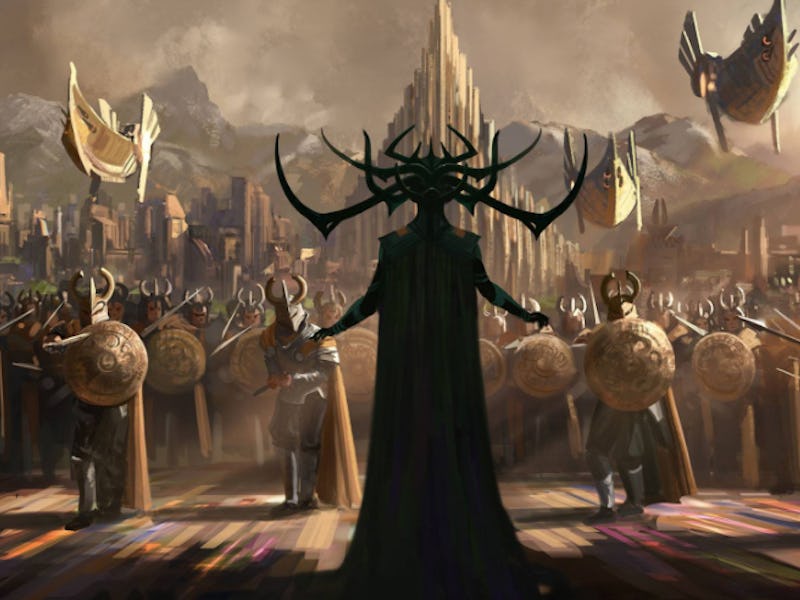Sci-Fi Poet Who Wrote 'Ragnarok' Explains Norse Myth in 'Thor: Ragnarok'
Paul Park gives an alternate Marvel pitch.

The first thing you should do after seeing Thor: Ragnarok isn’t to watch any of the other entries in the Marvel Cinematic Universe, but instead go read a poem called “Ragnarok” written by award-winning sci-fi and fantasy author Paul Park. In 2011, Park published the poem which uses the Norse myths as a way to talk about potential real-world calamities. But what did the “Ragnarok” in Thor: Ragnarok have in common with the “real” Ragnarok of Norse myth. As Park explains, not quite enough.
“The movie’s writers had a difficult task,” Park tells Inverse. “Ragnarok, the Norse apocalypse, takes place in the future. It is a story of cataclysm and rebirth, the utter destruction of the old world, including most of the pantheon of gods and heroes, amid the promise of a new reality in a beautiful fresh landscape, under a new sun.” But, as the author and poet explains, the Marvel version of Ragnarok was limited to one specific place and time, otherwise, there can’t be other Marvel movies.
Paul Park and the illustration for his poem "Ragnarok.' (Art by Richard Anderson)
“So, the solution is to put Ragnarok into the distant past, and suggest that the rebirth was a more local one, in which the (conveniently blond) survivors of Asgard, post apocalypse, escape to resettle prehistoric Norway. Thor and Loki and Heimdall remain alive, because they have to be alive for the other movies to make sense.”
What Park means is that Odin hanging out in Norway at the beginning of Thor: Ragnarok was a way for the MCU to vaguely match up with Earth mythology. And, if all of the survivors of Asgard come to Earth by the next Avengers movie, they might not all end up in the present. In fact, some of them have to end up in our past. Because the first Thor established that Thor is the same Thor from Norse legends, it stands to reason that the spaceship in Ragnarok gets redirected to Earth’s past, rather than 2018. Obviously, if this actually happens, Thor will have time travel to get with the rest of the Avengers… or something.
This wolf should have been a bigger deal.
Still, in Park’s mind, the concept of Ragnarok was robbed of some of its destructive mojo. “For reasons of script continuity, this Ragnarok can’t really involve any destruction at all—just the city of Asgard itself, a place we don’t care much about, although I did like how the gods’ palace resembles Hallgrimskirkja, the main cathedral in Reykjavik, which is also the site of the massacre in my poem.”
Park contends that “Ragnarok isn’t really Ragnarok,” but that he himself appropriated the term for his poem. “It’s not really Ragnarok in my poem either—the title is sort of ironic. The story takes place in a [fictional] post-apocalyptic Iceland, where the modern world has come to an end, and things are in chaos, and we can imagine a new version of the medieval age,” he explains. “As for someone coming across my poem, fresh from immersion in the Marvel universe—that would be fine. I imagine he or she might be disappointed, because it’s not a magical story, or one that involves gods or heroes; that’s where the irony resides, because I do think it might be possible for us to destroy the world, and not as a result of cataclysmic struggles between noble forces and wicked ones.”
Still, what would have happened had Thor: Ragnarok stayed closer to the real myth, and really included a shitload of legit destruction and murder? “The events of the legend are so stupendous and cinematic—well, it would be great to see them actually dramatized,” he says and then describes how the actual myth plays out.
What if blood was dripping from Loki's mouth?
“Loki is loosed from his prison, where he’s been laid out with poison dripping on his face after the murder of Baldur, and now gathering together his demonic children, Fenrir the wolf and the midgard serpent, and the frost giants and fire giants breaking out of their worlds, and on earth a stupefying convulsion of lust and violence that leaves only two survivors, and the valiant gods and valkyries dying one by one, each one vanquishing a monster, and the sun blotted out, and dark water swallowing the globe.
“If the Marvel people really had wanted to do justice to the theme, they could have brought in Iron Man and the Hulk and Black Widow and Jeremy Renner and all the rest, and put each one of them into a self-sacrificing struggle to the death with the entire cast of Marvel villains, while in the meantime all the cities of earth explode and burn and drown. The death ship sails on the blood-red sea. I’d love to watch that. Who wouldn’t?”
Thor: Ragnarok is out in wide release now. Paul Park is the author of several award-winning science fiction and fantasy novels including All Those Vanished Engines and Soldiers of Paradise. You can read his award-winning poem — “Ragnarok” — here.